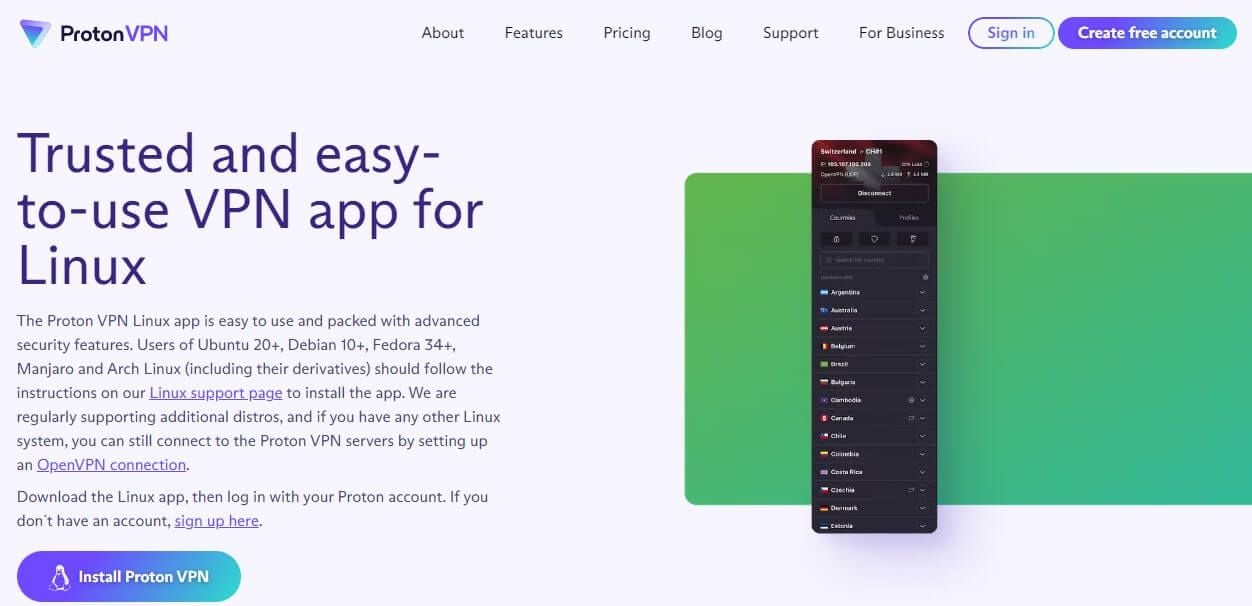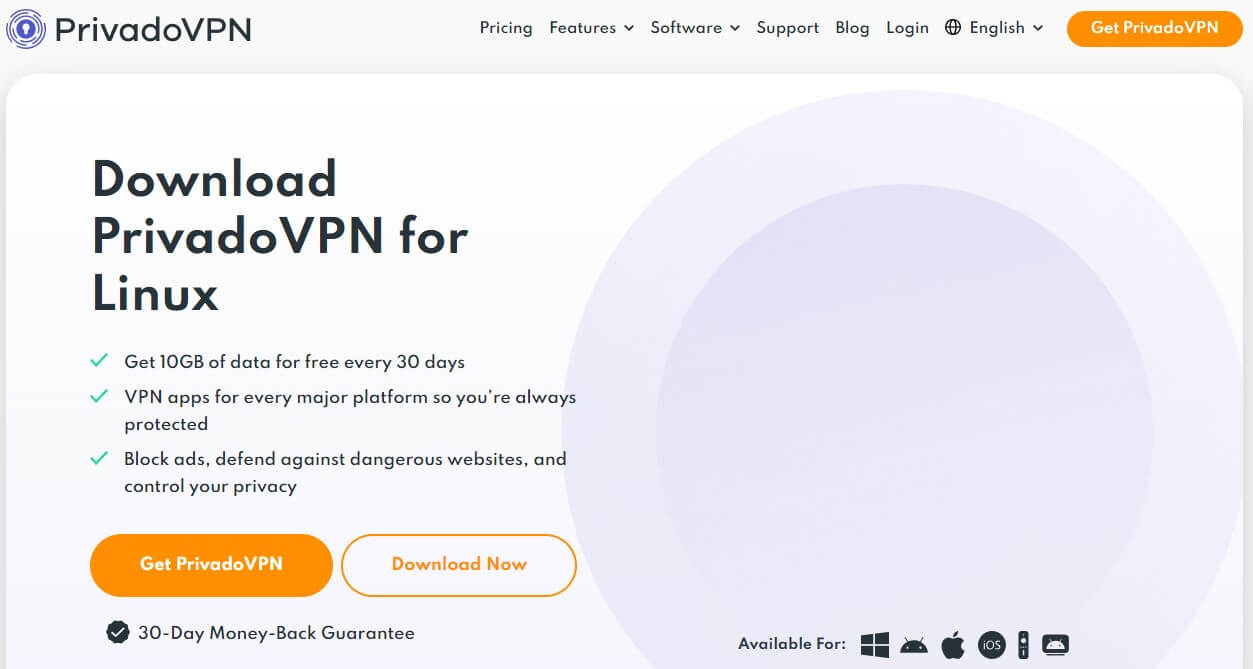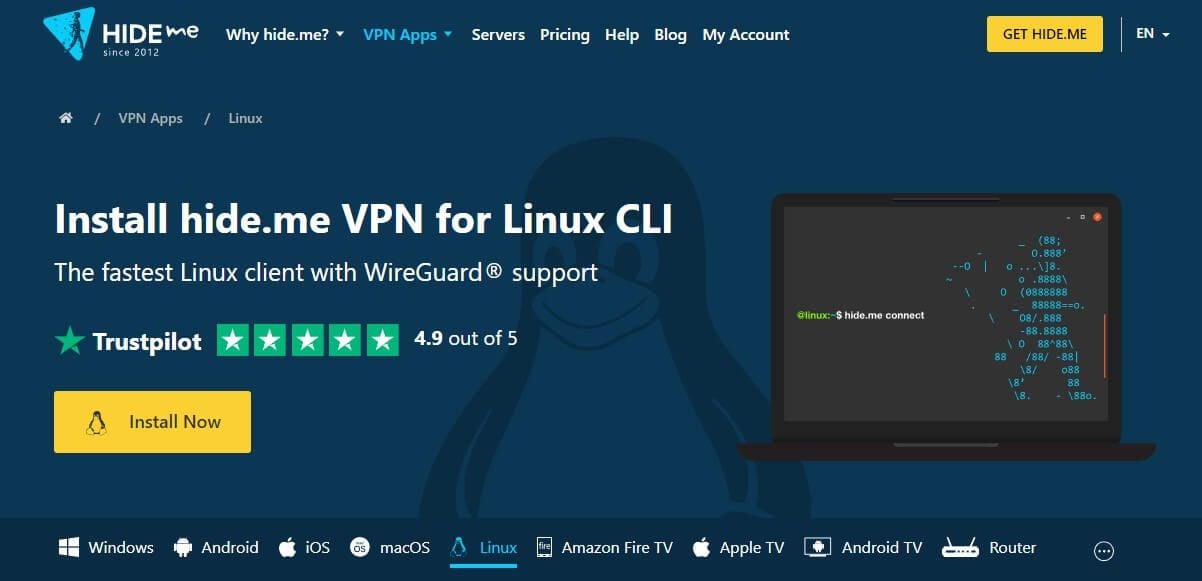
Linux is a platform that many people like due to its open-source nature. It’s also popular due to many distros, such as Mint, Ubuntu, Debian, and others, which allow you to choose your working environment and fully customize the system. Above all, people use this system because it’s FREE and won’t cost you anything compared to Windows. The great thing is that you can install a free VPN on pretty much any Linux distro and enjoy the safety and security online while you surf the internet.
On top of that, a free Linux VPN will secure your P2P traffic, prevent ISP throttling, and help you avoid government surveillance, giving you total privacy and anonymity. Wondering which free VPN providers you should consider on Linux? Well, we have plenty of options for today, so let’s check them out right away.
Best Free VPNs for Linux in 2025
In a hurry? No problem. The best and recommended free VPNs for Linux are:
All three can be free for up to 45 days and are vastly better than 100% free Linux VPNs. However, if you want to pay nothing and still use safe providers, consider the three below. Just be careful – they offer limited speeds, bandwidth restrictions, no streaming/P2P, and no simultaneous connections.
- Proton VPN
- PrivadoVPN
- Hide.me
Best Free VPN for Linux for Up To 45 Days
In our recent guide, we talk about the best premium VPNs for Linux.
Here, we explained that using a paid provider is a much better choice, as they’re unlimited in terms of bandwidth and performance, plus, they come with a wide array of security features that 100% free services are missing.
With that in mind, we decided to present to you 3 paid Linux VPN services that you can use for free for up to 45 days.
NordVPN (Free for 30 Days)
Kicking off this list, we have the best free VPN for Linux for 30 days – NordVPN. This provider boasts a verified no-logging policy with three audits from PwC and one from Deloitte. However, it has much more to offer, such as 6,400+ servers in 111 countries, Double VPN, obfuscated servers, and P2P servers for torrenting.

Its Linux support is top-notch, and aside from Ubuntu, it supports systems like Mint, Elementary OS, Debian, and many more. It even offers a full setup guide on its site, so once you subscribe and download its app, you can install the VPN in a minute or two.
NordVPN has this NordLynx protocol, which delivers stunning speeds and impressive security. Much like the next two free Linux VPN providers, it has unlimited bandwidth and 10 Gbps speeds, making for smooth gaming, streaming, downloading torrents, or any other activity.
We like its inclusion of antivirus and malware protection, which will increase your level of security tremendously. Plus, the provider is capable of streaming, so you can unblock geo-restricted platforms with no problems, even when talking about the most “stubborn” ones.
NordVPN also works in China and you can use its Double VPN servers to double your encryption if your online security is your priority. The provider is easy to use as well, and with 10 simultaneous connections, protecting all your devices shouldn’t be an issue.
As stated, the provider is the top-rated free VPN for Linux for 30 days due to a 30-day refund policy. Price-wise, it’s cheaper than the next pick, ExpressVPN, so it’s more than affordable. You can still get its cheapest deal below and enjoy it for 30 days before getting a full refund – what are you waiting for?
For more details on how to do this, read our NordVPN free trial guide.
Pros
- Double VPN servers
- Threat Protection
- Three security audits by PwC/Deloitte
- No limits on bandwidth and speeds
- Meshnet is handy for remote access to other devices
- Extraordinary compatibility
Cons
- Value-added taxes in particular countries
- No GUI on Linux
ExpressVPN (Free for 30 Days)
ExpressVPN is the next best free VPN for Linux for 30 days, thanks to a great 30-day refund policy.
Yes, it’s a paid provider but it comes with a 49% discount and 3 free months for the annual plan followed by a 30-day money-back guarantee for ALL plans.

This means you can get it now and enjoy the provider for 30 days before getting a full refund, no questions asked. ExpressVPN is a great VPN for Ubuntu but also distros like Arch, Mint, Fedora, and Debian.
On top of that, it offers unlimited bandwidth and 10+ Gbps speeds, which allows you to browse the web, download torrents, or enjoy streaming smoothly. We should mention its 256-bit encryption coupled with an automatic kill switch that works flawlessly.
There’s also the Lightway protocol which offers superb performance in every sense. Based in the British Virgin Islands, ExpressVPN stores no logs of your browsing data and personal info, meaning you can enjoy anonymity and privacy at any time.
Its Linux setup isn’t the simplest but you have all the instructions on the site for each distro. The VPN service is very easy to use on Linux and offers 3,000+ servers in 105 countries for you to choose from. Each server is optimized for blazing-fast speeds and can be used for a variety of purposes.
Of course, the service works with other platforms like Windows, macOS, Android, and iOS. With 8 simultaneous connections, you can protect all your devices at no additional cost. Lastly, 24/7 support through live chat is here, allowing you to get help easily if things go south.
However, ExpressVPN is extremely reliable and I can confirm it’s a respectable free Linux VPN in 2025 if you’re looking to take advantage of its refund policy. You will pay at the start but when you get fully reimbursed, it’s like you paid nothing because you got your money back.
Pros
- Unlimited bandwidth
- 10 Gbps speeds
- Allows for P2P and streaming
- Support for Debian, Fedora, Arch, Mint, and Ubuntu
- 3,000+ servers in 105 countries
- No logs are stored
Cons
- Not the most affordable prices
- Its Linux setup isn’t the simplest
CyberGhost (Free for 45 Days)
CyberGhost is so affordable that it’s almost a truly free VPN for Linux. Yet, despite its affordable prices, it still rocks a 45-day money-back guarantee for all plans longer than a month.
This allows you to enjoy it for a month and a half without having to worry about limited bandwidth or painfully slow speeds.

Moreover, CyberGhost is a great risk-free VPN for Linux due to the 11,000+ servers in 100+ countries that it offers. These servers are optimized for torrenting and streaming, but you also get NoSpy servers operated by CyberGhost directly for the highest level of privacy.
In addition, the provider works with the most popular Linux distros, such as Fedora, Kali, CentOS, Mint, Ubuntu, and even PoP!_OS. As a result, users can easily install it and enjoy all of its great features, some of which include WireGuard, a kill switch, and full OpenVPN support.
This Romanian provider focuses on your privacy too and it’s a pure zero-logging VPN that won’t store any logs of your personal data. This is further backed up by transparency reports published every 3 months, which adds to the overall trustworthiness.
Linux users will be delighted with how fast it is, which can be useful if you’re gaming, streaming on foreign TV channels, or simply surfing the web and you want a smooth experience. However, it packs 7 simultaneous connections, which is 3 less compared to a superior option, NordVPN.
The accent is put on affordability, as said, so CyberGhost is the cheapest pick on the list. With a 45-day money-back guarantee (which is similar to a free trial of CyberGhost), you can really use it as a free VPN for Linux. Simply purchase it for the cheapest price by using the button below, enjoy it for 45 days, and get a refund by using live chat support.
You’ll get refunded with no questions asked as soon as you request a refund, making it easy to get a 100% free VPN instead, or perhaps, try NordVPN using the same trick.
Pros
- 12,000+ worldwide servers
- WireGuard + OpenVPN support
- Simple Linux setup
- Servers optimized for streaming and torrenting
- 45-day money-back guarantee
Con
- Not great for overcoming censorship in China
- Limited to 7 simultaneous connections
Best 100% Free VPNs for Linux: These 3 REALLY Work
After presenting some risk-free VPN services for Linux, I think it’s time to talk about the best 100% free VPNs for this platform. The difference between these 3 and the 3 providers above is that these 3 are really free and they can be used without paying anything indefinitely.
However, while this is the main difference, you’ll notice there are tons of other differences in terms of performance and general limitations. Still, you asked for it and we’re delivering it, so let’s talk about my favorite free Linux VPNs in 2025.
1. Proton VPN
Proton VPN isn’t a blazing-fast free VPN for Linux. It’s actually slower than PrivadoVPN but offers unlimited bandwidth, which will closely resemble a premium experience at least in this aspect.
This Swiss provider has a lot to offer and is a surprisingly good pick.

For one, this free VPN fully supports Linux. Users who use Ubuntu, Fedora, Manjaro, Arch, and Debian can use Proton VPN, albeit, by using the OpenVPN connection. While Proton VPN supports WireGuard in the free version, Linux users are currently limited to OpenVPN.
Regardless, this provider is a powerhouse of privacy and comes with great features like AES-256 encryption, an automatic kill switch, split tunneling, and DNS/IP leak protection. We like that, unlike many other free Linux VPNs, Proton VPN actually offers a great GUI!
This means you don’t have to learn its Terminal commands, instead, you can use a full-fledged application as you’d do on Windows, macOS, Android, or iOS. Its free version is extremely secure and even if you’re a free user, Proton VPN will still adhere to its no-logging policy.
The downside is that you’re getting a slow VPN with no option to select the VPN location. The bad news here is that Proton VPN strictly forbids P2P traffic and can’t unblock a single streaming service, which is disappointing.
You also don’t get Secure Core servers, NetShield, and other advanced functionalities that premium users can enjoy effortlessly. One of the worst things about it is customer service, as the provider offers no 24/7 live chat support, leaving you to wait for quite a while before it responds to your inquiry.
Overall, Proton VPN is great for general browsing thanks to unlimited bandwidth. But if you’re looking for anything more than that, you’ll be heartbroken. To unlock its full potential, you can get its premium plan but keep in mind it’s very expensive and not recommended compared to the VPNs we mentioned.
Pros
- Unlimited traffic
- Support for Manjaro, Arch, Debian, Fedora, and Ubuntu
- A GUI for Linux
Cons
- Forbidden P2P traffic
- No streaming support
- Slow speeds
- Secure Core servers and NetShield are absent from the free version
- No option to pick the server location you want
2. PrivadoVPN
PrivadoVPN is a very interesting provider that’s enjoying huge growth in popularity in 2025. By default, it’s a premium VPN service but you can use it for free and it supports Linux. The provider is known for its beautiful interface and ease of use that welcomes even total newbies.

In addition, the service offers impressive performance for a free VPN, letting you enjoy the smoothness of day-to-day browsing and light streaming on Linux. PrivadoVPN is a secure provider thanks to 256-bit encryption and a kill switch that works like a charm.
Its OpenVPN support is impressive and you get IP/DNS leak protection for additional security. A no-logging policy is here too and Linux users will browse the web in anonymity with no stored data related to their browsing history, IP addresses, and other sensitive information.
This free VPN for Linux supports many distros like Ubuntu, Debian, and others. And much like Proton VPN, you can enjoy the Terminal and GUI versions if that’s what you prefer. You get setup guides for both versions on the site and while its setup isn’t the simplest, it shouldn’t pose a problem.
Once it’s set up, you can enjoy all of the aforementioned features easily. Downsides? Well, PrivadoVPN also limits your bandwidth but this time to 10 GB a month. Its premium plan offers significantly more security features and servers too and you don’t get any advanced features.
In the free version, PrivadoVPN isn’t great for streaming and it rarely unblocks any streaming services. Your speed is limited and you don’t get 10 Gbps performance as is the case with the premium version. With 10 server locations in total, PrivadoVPN surely won’t make you jump in excitement.
However, if you’re ready for limitations and don’t expect a VPN to take you to the moon, this is a fairly good choice. You can also consider its premium plan but I don’t advise that since you can use NordVPN, ExpressVPN, or CyberGhost, all of which are better premium services.
Pros
- Solid speeds for a free service
- Terminal and GUI app variants
- It stores no logs of your activities
Cons
- A monthly bandwidth limit of 10 GB
- Automatic kill switch
- 10 servers in the free version
- It supports only OpenVPN on Linux
- No advanced features in the free version
3. Hide.me
Hide.me promises some great things to look forward to, such as impeccable security and privacy. Indeed, even as a free Linux-compatible VPN service, Hide.me comes with AES-256 encryption and a kill switch for securing your connection.

Furthermore, this provider offers relatively fast speeds for a free service, so you won’t have to worry about throttling and not being able to browse the web smoothly. We actually reviewed Opera VPN not long ago and this free service had terrible speeds, unlike Hide.me.
Hide.me’s no-logging practices will also surprise many users. It’s based in Malaysia, hence it has a certified no-logging policy, storing no information related to your IP address, DNS requests, browsing history, geolocation, and other sensitive data.
This is accompanied by its easy-to-use VPN apps, which apply to Linux as well. Speaking of Linux, the provider supports i386 and x86_64 systems where it offers full OpenVPN support that can be set up using the Terminal.
Once you set it up, features like Private DNS, a kill switch, and IP leak protection will be there, making sure you’re secure online. Unfortunately, being a free Linux VPN, the service doesn’t limit your bandwidth but its performance isn’t the most stable.
Above all, I’d like to point out that you get just 8 free server locations, two of which are in the US and the others in the Netherlands, Singapore, and a few more countries.
This is a crippling limitation considering that the provider won’t allow you to bypass geo-restrictions or download torrents limitlessly. P2P is forbidden, in fact.
Free servers aren’t optimized for any of these activities and you don’t get MultiHop servers and other advanced features like the Bolt proxy. By the way, its support isn’t the greatest either and won’t be as responsive as the support team of NordVPN or ExpressVPN.
However, it’s still free and you can use it without any time limit. That is if you don’t mind speed limits and all the other caveats we mentioned. If you do, it’s much better to pick a provider from the 3 almost free VPNs for Linux I mentioned previously.
Pros
- Decent performance
- 256-bit encryption
- No-logging policy
Cons
- No MultiHop in the free version
- Just 8 server locations
- Streaming websites won’t work
- Hide.me blocks torrenting completely
- The lack of WireGuard in the free VPN is discouraging
Free VPNs for Linux to Avoid
When talking about the best free VPNs for Linux, not all of them are safe and secure. The providers I’ve listed are tested by my team and we can guarantee they’ll work with no problems. But then, you have other free providers with insane promises that failed to meet our expectations.
Here are which free VPN services you should AVOID if you’re on Linux.
Hotspot Shield
Hotspot Shield is a premium provider with a free plan that you can download from the site. And while it supports Fedora, Ubuntu, Debian, and CentOS, the trick is that it requires a premium plan to be usable on Linux. If you use its free version, you can forget about it.
But even if its free version worked on Linux, you should still avoid this provider. It’s very intrusive in terms of logging and it’ll jeopardize your privacy by storing even the most sensitive information on its servers, making it a poor option for anonymizing your traffic.
SecurityKISS
SecurityKISS is another provider that many people recommend for Linux distros. Don’t listen to these recommendations, as this free Linux VPN is far from being great. Its privacy policy is flimsy and it’s speculated that it actually stores a lot of user information, which negatively influences your privacy.
One of the worst aspects of SecurityKISS is that it’s outdated and uses old VPN protocols. People complain about its use of PPTP, which is one of the least secure protocols that can lead to exposing your IP address to the public and completely eliminate all the security you had previously.
Speedify
Speedify is a simple-to-use free VPN that requires no account. It works on Linux but has two annoyances I can’t get over. For one, it has a tiny 2 GB bandwidth limit, which won’t allow you to use it for more than a day – and I’m very generous.
The most alarming thing about it is its privacy policy. Speedify will store logs of your browsing history, IP address, and all other sensitive bits of information. When looking for the best free VPN for Linux in 2025, this is the last thing you want if you care even the slightest about your online privacy.
What Makes a Great Free VPN for Linux?
With the 6 free Linux VPNs presented, we should explain our criteria for selection. Our list wasn’t generated by AI or built randomly, as our team of experts hand-picked every VPN based on experience. In short, this is what we looked for in each:
- Security. Many free VPNs for Linux suffer from a lack of security features. Not these! Whether you choose paid or really free services, you can enjoy bank-grade encryption, IP/DNS leak protection, and features like split tunneling and a kill switch. Better yet, these services display no IP leaks, so they’re bulletproof.
- Privacy. Free providers tend to store logs and violate your privacy. As expected, none of our chosen providers do that. They’re built for privacy, offering RAM servers, no-logs policies, and several third-party audits under their belts.
- Performance. Proton VPN might be a tad slower but overall, all of these VPNs are enjoyable to use. They have 10 Gbps servers and offer WireGuard for the best performance. NordVPN is the fastest but PrivadoVPN is also stellar.
- Ease of use. Our really free Linux VPN providers require only your email. No complex setups and sign-up processes to take your time. Their apps are beginner-friendly and allow for one-click connections. Talk about simplicity!
- Compatibility. All 6 providers have apps for all major platforms. The first 3 even support tvOS, routers, Smart TVs, and other devices. The other 3 work on iOS, Android, Windows, macOS, and Linux, so all your phones, computers, laptops, and tablets can be protected for FREE.
Bottom Line
The bottom line is that you can go two ways regarding the top free Linux VPNs. You can choose NordVPN, ExpressVPN, or CyberGhost and use them for free for up to 30-45 days. For me, this is the best way to go, as you get no bandwidth limits and you can enjoy streaming, security, and privacy.
The downside is that you’re time-constrained if you don’t want to be charged. Another way is to use a 100% free VPN for Linux, such as Proton VPN, PrivadoVPN, and Hide.me VPN. These providers require no payment and they can be used free of charge forever.
They, however, come with bandwidth limits, slower speeds, the lack of advanced security features, and no simultaneous connections. At least they’re safe and secure since they store no logs, so if this is your priority, you don’t have to worry even though you’re using a free service.
In total, I gave you 6 VPN providers to consider as a Linux user – 3 risk-free and 3 free options. Now that you know which providers to consider and which to avoid, I think it’s much easier to make a decision. Which one will you choose as your free VPN for Linux?
FAQ
Let’s now answer a few more questions related to the topic to make sure you fully understand how free VPNs for Linux function.
Are free VPNs for Linux safe?
Yes, they are, as long as you choose a service from our list. Not all of them are safe, of course, and providers like Hotspot Shield, Speedify, and SecurityKISS are only some of the choices you should avoid. Proton VPN, PrivadoVPN, and Hide.me are completely safe.
They store no logs and offer plenty of security features, allowing you to enjoy the highest level of privacy and security even as a free user. In fact, we invite you to read our Hide.me VPN test and review to see our honest opinion about it.
How to install a free VPN on Linux?
Installing a VPN on Linux functions the same as installing it on Windows, for example. If you have a free VPN for Linux that fully supports this platform, all you need to do is download the setup file and install it as you normally do.
Providers that don’t support the platform natively require the OpenVPN client. This app is inferior, as it doesn’t offer advanced security features, such as a kill switch, so you don’t get the same level of security. Do the free VPNs we presented have native support for Linux?
Yes, they do. That’s why you can go to their sites, download the app, and install it on your distro without problems.
What is the most secure Linux distro?
The most secure distro, according to many experts, is Kali. It has advanced Penetration Testing, which does a great job of preventing potential hackers and cyber threats from entering the system. Still, it’s not perfect and is prone to penetration as is the case with every other OS.
If you want to keep cyber threats away and make sure you’re browsing the web safely, using a good free Linux VPN is still highly recommended.
Does Linux have a built-in free VPN?
No, it doesn’t have a built-in free VPN. This shouldn’t be an issue, as you can install one in less than a minute and take advantage of its features right away. Proton VPN is our number one recommendation and if you want the best free VPN for Linux (but only for 30 days), we recommend NordVPN.